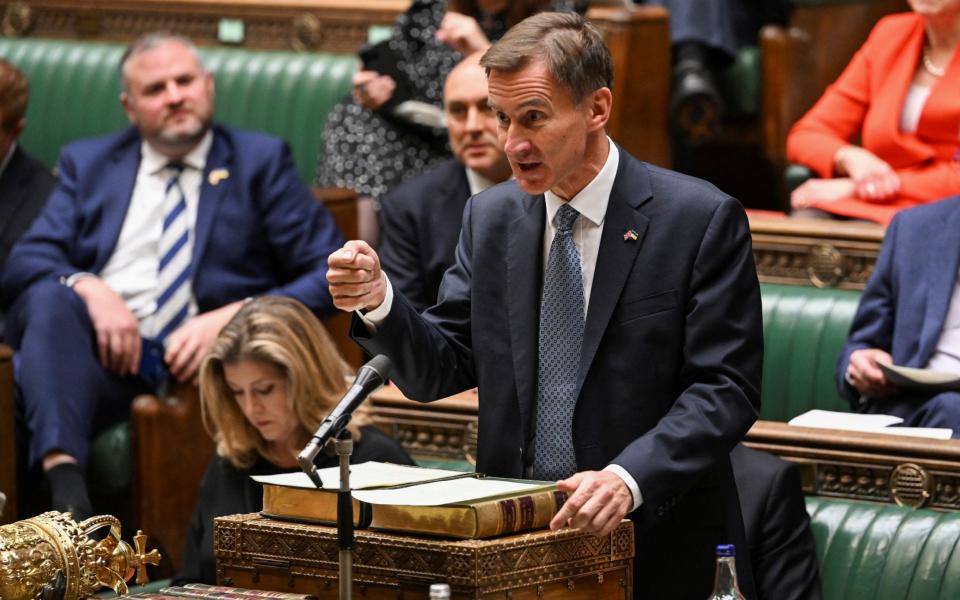Triple lock means retirees will pay income tax on state pension by 2030

Every retired person claiming the full new state pension is at risk of paying income tax for the first time as the triple lock drives up payments in line with surging inflation.
The pension will rise to £12,544 a year in 2028, according to analysis of figures from the Office for Budget Responsibility (OBR) by Canada Life - just £26 below the threshold for paying the basic rate of income tax.
It means that if inflation slightly overshoots the OBR estimate, hundreds of thousands of pensioners will become taxpayers for the first time since retirement.
Jeremy Hunt has confirmed that he will keep the triple lock, a promise to increase the state pension by whichever is the largest of inflation, wage growth and 2.5pc.
This means that the new state pension - currently £9,628 - will rise by around 30pc in the next six years according to the OBR. Meanwhile, the Chancellor is freezing the tax-free personal allowance at £12,570 until 2028.
If the state pension eventually exceeds the personal allowance, the 20 per cent basic rate of income tax will be due on earnings above the threshold.
More than 12 million retirees paid the state pension will get a record 10.1 per cent increase in their income next year alone.
The new state pension will rise to as much as £10,600 a year, and the older basic state pension for those who qualified before 2016 will increase to as much as £8,122.
Andrew Tully, of Canada Life, said: “The frozen personal allowance, and income tax thresholds, are a stealth tax which will potentially drag millions more pensioners into paying income tax for the first time or paying higher rate tax when they were previously basic rate taxpayers.”
Mr Tully warned that many retirees may be required to complete a self-assessment return for the first time, creating an administrative headache both for pensioners and HM Revenue & Customs.
The Chancellor also announced on Thursday that a review of the state pension age would be published earlier than expected next year – prompting fears that the state pension age could be increased to save the Treasury more money.
Former pensions minister Sir Steve Webb, of consultancy LCP, said: “A combination of freezes on the main personal allowance and large cash increases in the state pension means the majority of pensioners can now expect to be taxpayers in a few years’ time.
“While it is fair enough for better off pensioners to pay their fair share of tax, it seems hard to justify a system where someone who has no income beyond a state pension and is potentially entitled to help with rent or council tax because they are on a low income should find themselves in the tax net.”
Analysis from LCP has previously shown that half a million retirees will pay income tax as a result of next year's triple lock boost and the extended freeze to the personal allowance.
Maintaining the manifesto pledge is expensive for the Treasury. The decision to opt for an inflation link rather than an earnings link will cost the Treasury an additional £5bn next spring.
Former chancellor Phillip Hammond warned earlier this month that the Conservatives should review its long-term commitment to the state pension triple lock because it was “difficult to justify”.
With each one percentage point rise in the state pension costing the Treasury £0.9bn, Mr Tully said a “grown-up conversation” on the future of the triple lock was sorely needed.
He said: “This seems unsustainable in the long-term and, with increases in life expectancy, despite these slowing, the cost of state pensions will continue increasing unless some changes take place.”
Helen Morrissey, of the broker Hargreaves Lansdown, said: “The idea of pensioners wholly reliant on state pension potentially paying tax is a real unintended consequence that will need to be addressed.
"However, 2028 is a long time away and we will have had a general election and potentially a change of government by then, who may have a very different view on such a lengthy income tax threshold freeze.”
The state pension increased by only 3.1pc in 2022 after the triple lock was temporarily scrapped when the pandemic exaggerated wage growth figures.
Steven Cameron, of the pensions specialist Aegon, said that for most retirees had both a private pension and a state pension, and the private schemes were tasked with deducting tax.
But he said: "There will be a minority of people with no private pension, who rely just on the state pension. The logical outcome of this would be HMRC and DWP working together to deduct tax from the state pension."
Sean McCann, of financial advice firm NFU Mutual, warned that Mr Hunt's move to cut the dividend allowance down from £2,000 to £500 would also mean that state pensioners who relied on investment income faced paying more tax thanks to the triple lock.

 Yahoo Finance
Yahoo Finance 